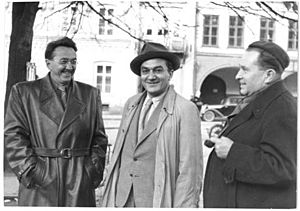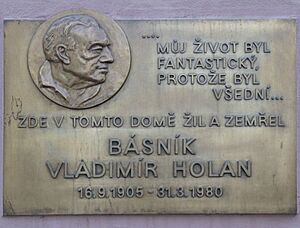Vladimír Holan facts for kids
Quick facts for kids
Vladimír Holan
|
|
|---|---|

Vladimír Holan (in the middle)
|
|
| Born | September 16, 1905 |
| Died | March 31, 1980 (aged 74) Prague, Czechoslovakia
|
| Nationality | Czech |
| Occupation | Poet, Writer, Translator |
| Years active | 1926-1977 |
|
Notable work
|
Triumph of Death A Night with Hamlet Panychida |
Vladimír Holan (born September 16, 1905 – died March 31, 1980) was a famous poet from Czechoslovakia. He was known for using words and ideas that sometimes felt mysterious or deep. His poems often explored serious topics and sometimes had a thoughtful, quiet feel. He was even considered for the Nobel Prize in the late 1960s, which is a very big award for writers.
Contents
Life Story
Holan was born in Prague, which is the capital city of the Czech Republic today. But he spent most of his childhood outside of Prague. When he moved back in the 1920s, he studied law. He also started a job as a clerk, which meant he did office work. He didn't really enjoy this job.
In 1932, he got married to Věra Pilařová. That same year, he published a collection of poems called Vanutí (which means "Breezing"). He thought this was his first real poetry book, even though he had published two others before it. A famous Czech critic, František Xaver Šalda, reviewed his work and said good things about it.
Poetry and World Events
In the 1930s, Holan kept writing his unique, deep poems. He also started to write about his feelings on political events. For example, he wrote about the Spanish Civil War.
Later, he wrote poems like Odpověď Francii (The Reply to France) and Září 1938 (September 1938). These poems were about the difficult situation in Czechoslovakia between 1938 and 1939. These poems helped more people understand his work and made him more popular. His poem Sen (The Dream), published in 1939, seemed to predict a terrible war.
During World War II, he wrote poetic stories about his country's struggles. After the war, he wrote Panychida, which was like a powerful record of the events. He also wrote poems celebrating the Red Army. Around this time, he left the Catholic Church and joined the Communist Party.
Challenges and Later Years
In 1949, after the communists took power, Holan faced some problems. He and another poet, Jaroslav Seifert, criticized a Soviet poet. Because of this, they were not allowed to publish new works for a while. Holan then left the Communist Party and returned to the Catholic Church.
In the 1950s and 1960s, he wrote longer poems that mixed real-life events with deep, imaginative ideas. One of his most famous works in English is Noc s Hamletem (A Night with Hamlet, 1964). This poem became one of the most translated Czech poems. He also wrote short, wise poems that sometimes hinted at political ideas. He became known as a poet who preferred to stay private and away from public life.
Holan had a daughter named Kateřina, born in 1949. She had Down syndrome. He wrote a special poem for her called Bajaja. This poem, along with Jaroslav Seifert's Maminka, is considered a very important part of Czech children's poetry. The famous artist Jiří Trnka drew pictures for the book. When his daughter passed away in 1977, Holan was very sad and stopped writing. He died in Prague in 1980 and was buried in Olšany Cemetery.
When crossing over from nature to existence,
walls are rather unkind,
walls wet from the urine of talents, walls bespattered
by eunuchs revolting against the spirit, walls not diminished
even though they may not yet be born,
and still walls already rounding out the fruit of the womb...—Vladimír Holan
His Works
Poetry Collections
Early Poems
- Blouznivý vějíř (1926)
- Triumf smrti (1930, 1936, 1948)
Experimental Poems from the 1930s
- Vanutí (1932)
- Oblouk (1934)
- Kameni, přicházíš… (1937)
Poems About Politics
- Září (1938)
- Odpověď Francii (written 1938, published 1945)
- Sen (1939)
- Záhřmotí (1940)
- První testament (1940)
- Zpěv tříkrálový
- Chór
Poems Celebrating Liberation
- Dík Sovětskému svazu (1945)
- Panychida (1945)
- Tobě (1947)
- Rudoarmějci (1947)
Lyrical Poems After World War II
- Bolest
- Strach
- Toskána (1963)
- Mozartiana (1963)
- Noc s Hamletem (1964)
- Noc s Ofélií (1970)
- Bajaja (1955)
- Bez názvu (1963)
- Na postupu (1964)
- Na sotnách (1967)
- Asklépiovi kohouta (1970)
- Předposlední (1982)
- Sbohem? (1982)
Epic Poems
- Terezka Planetová (1943)
- Cesta mraku (1945)
- Příběhy (1963)
Prose Works
- Kolury
- Lemuria
- Hadry, kosti, kůže
- Torzo
As a Translator
Vladimír Holan also translated poems from many different languages. He translated works from French, German, Russian, Polish, and others. Some of the poets he translated include Rainer Maria Rilke, Mikhail Lermontov, Charles Baudelaire, and Adam Mickiewicz.
See also
 In Spanish: Vladimír Holan para niños
In Spanish: Vladimír Holan para niños
 | James Van Der Zee |
 | Alma Thomas |
 | Ellis Wilson |
 | Margaret Taylor-Burroughs |


